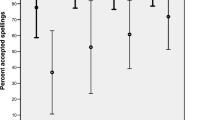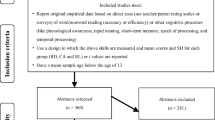Abstract
In research on dyslexia, inadequate or inappropriate comparisons have often been made with control subjects, frequently overlooking important gender differences. More information is needed regarding the performance of control subjects, and adults, on measures purportedly assessing phonological and orthographic processing. Using tests similar to those used in dyslexic research, 20 female and 20 male college-age students were tested to examine gender differences in phonetic processing skills. The findings suggest that in equally competent readers, gender and other factors do play a significant role in determining the time it takes for phoneme manipulation and word identification. Females, especially those with poorer academic records, are significantly slower than males on measures typically used in dyslexic research. These findings show a need for a reexamination of control group equivalence (especially regarding gender), and further exploration of variables that might influence performance on these tasks.
Similar content being viewed by others
References
Ben-Dror, I., Pollatsek, A., & Scarpati, S. (1991). Word identification in isolation and in context by college dyslexic students. Brain and Language 40: 471–490.
Bowers, P. G., & Wolf, M. (1993). Theoretical links among naming speed, precise timing mechanisms and orthographic skill in dyslexia. Reading and Writing: An Interdisciplinary Journal 5: 69–85.
Bruck, M. (1992). Persistence of dyslexics’ phonological awareness deficits. Developmental Psychology 28: 874–886.
Byrne, B., & Ledez J. (1983). Phonological awareness in reading-disabled adults. Australian Journal of Psychology 35: 185–197.
Felton, R. H., Naylor, C. E., & Wood, F. B. (1990). Neuropsychological profile of adult dyslexics. Brain and Language 39:485–497.
Finucci, J. M., & Childs, B. (1981). Are there really more dyslexic boys than girls? In A. Ansara, N. Geschwind, A. Galaburda, M. Albert, & N. Gartrell (eds.), Sex differences in dyslexia. Towson, MD: The Orton Dyslexia Society.
Gjessing, H. J., & Karlsen, B. (1989). A longitudinal study of dyslexia: Bergen’s multivariate study of children’s learning disabilities. New York: Springer-Verlag.
Hyde, J. S., & Linn, M. C. (1988). Gender differences in verbal ability: A meta-analysis. Psychological Bulletin 104: 53–69.
Kitz, W. R., & Nash, R. T. (1992). Testing the effectiveness of the Project Success Summer Program for adult dyslexies. Annals of Dyslexia 42: 3–24.
Kitz, W. R., & Tarver, S. G. (1989). Comparison of dyslexic and nondyslexic adults on decoding and phonemic awareness tasks. Annals of Dyslexia 39: 196–205.
Masland, R. L. (1981). Summary of the conference proceedings. In A. Ansara. N. Geschwind, A. Galaburda, M. Albert, & N. Gartrell (eds.), Sex differences in dyslexia. Towson, MD: The Orton Dyslexia Society.
Millar, D. G., & Barber, P. J. (1981). Sex differences in verbal skills: Use of spelling-sound and lexical information. Current Psychological Research 1: 121–127.
Pennington, B. F., Van Orden, G. C, Smith, S. D., Green, P. A., & Haith, M. M. (1990). Phonological processing skills and deficits in adult dyslexies. Child Development 61: 1753–1778.
Siegel, L. S., Share, D., & Geva, E. (1995). Evidence for superior orthographic skills in dyslexies. Psychological Science 6: 250–254.
Stanovich, K. E., & West, R. F. (1981). The effect of sentence context on ongoing word recognition: Tests of a two-process theory. Journal of Experimental Psychology: Human Perception and Performance 7: 658–672.
Steffens, M. L., Eilers, R. E., Gross-Glenn, K., & Jallad, B. (1992). Speech perception in adult subjects with familial dyslexia. Journal of Speech and Hearing 35: 192–200.
Sunseth, K., & Bowers, P. G. (1996). A double-deficit hypothesis of reading: Phonemic awareness and naming speed. Poster presented at the 104th Annual Convention of the American Psychological Association, Toronto.
Thompson, G. B. (1987). Three studies of predicted gender differences in processes of word reading. Journal of Educational Research 80: 212–219.
Wagner, R. K., Torgesen, J. K., Laughon, P., Simmons, K., & Rashotte, C. A. (1993). Development of young readers’ phonological processing abilities. Journal of Educational Psychology 85: 83–103.
Author information
Authors and Affiliations
Rights and permissions
About this article
Cite this article
Wallschlaeger, M., Hendricks, B. Gender differences in phonetic processing. Curr Psychol 16, 155–166 (1997). https://doi.org/10.1007/s12144-997-1021-0
Accepted:
Issue Date:
DOI: https://doi.org/10.1007/s12144-997-1021-0




